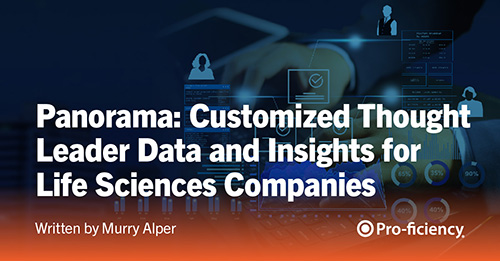Panorama: Customized Thought Leader Data and Insights for Life Sciences Companies
One of the key factors in the success of a new medical product is how well-accepted it is among healthcare practitioners (HCPs) and patients, both during development and upon commercialization. Life sciences companies often rely on thought leaders—sometimes also called opinion leaders—to help both spread information about a new product and to better target development and marketing efforts for new drugs or medical devices. And to use these individuals to their best potential, companies need to be able to quickly and easily identify which thought leaders are most important for their particular products.
Healthcare thought leaders or opinion leaders can be a factor in both recruiting patients to participate in clinical trials and maximizing acceptance of new products after commercialization. Thought leaders are looked to for insight on new products or treatments by both HCPs and patient communities. They can play a key role in increasing awareness of new commercial and investigational products, educating their peers about when and how new products may best be used and providing a sense of credibility among both HCPs and patients.
Thought leaders generally are trusted and well-respected individuals with proven expertise in a particular field. They can include prominent physicians, hospital executives, health system directors and researchers. They also may include less well-known professionals that have close ties to a particular patient or disease community.
Digital thought leaders—who make broad use of social media platforms like LinkedIn, Twitter and others to engage with and educate HCPs and patients—are also growing in importance. These thought leaders can be particularly effective in helping to drive information to the most relevant audiences by making use of social media algorithms to reach both the broadest and most-well-targeted audiences.
Finding key thought leaders
Many developers, manufacturers and contract research organizations (CROs) have their own internal processes for maintaining information about opinion leaders that they either have tapped for expertise in the past or have been following in anticipation of seeking their help with future products. But these—typically gleaned from a variety of sources, like applications, websites or internal tracking documentation, among others—are likely to have gaps in actionable information on their thought leaders.
For companies that have not developed such an internal resource, database service providers do exist. But use of generic, one-size-fits-all database providers will likely lack the specificity needed to meet each company’s or product’s individual needs. A generic database may, for instance, fail to take into consideration the needs and nuances of a specific company’s or team’s organization, objectives and strategies. A company’s insight-gathering needs may also be dependent on a particular patient population, disease state or other factors that cannot be fully captured with a generic database service.
A customized approach is more suitable to life sciences companies that are developing a wide array or product types for a range of disease states. For instance, Panorama, a thought leader management application acquired by Pro-ficiency earlier this year as part of Compass Group Partners, includes a database that can be configured specifically for an individual company’s specific needs and organizational structure. It can be geared specifically to target and manage information on thought leaders most important a specific disease state or therapeutic area, as well as include all the elements involved in strategic thought leader engagement planning. This negates the need for companies/team members to go to multiple data sources, as well as work in multiple documents where collaboration and version management are challenges.
Key factors to customization
This customization is borne out of a deep dive to understand not only each organization’s information needs, but also how teams are structured and how they work together and communicate. The customized database is then structured so that the information most important to the organization is quickly and easily accessible via an intuitive, customized dashboard.
The easy-to-use dashboard allows users to easily find information based on a variety of filters, from therapeutic expertise to affiliation to geographic location. The goal is to ensure that the application is configured to make the information most important to the company readily available. This includes the ability to easily generate needed reports and any other functionality that each individual company needs.
Information on thought leaders needs to be extensive, including their specific areas of expertise, affiliations, publications and clinical trials they have conducted, if applicable.
Panorama provides customization based on a deep understanding of the company, the teams that will be using the database, what their objectives are and how progress toward those objectives is measured. Key factors in providing customization include understanding:
- Brand or franchise objectives;
- How the company or team is organized; and
- The objectives and priorities for various levels of the team, which could include everything from providing updates on insights or engagement to senior management, to helping develop engagement plans with thought leaders.
And that level of customization doesn’t end with delivery of the product and training in its use. It’s equally important for sponsors to be able to modify the database over time according to business needs. Panorama is an adaptive platform, allowing end-users to add or subtract filters—such as disease state or geographical region—easily.
Panorama offers a true strategic partnership that includes ongoing support to ensure the tool can be used to its maximum capacity. This can include continual refinement of insight gathering and engagement plans and the ability to shift easily to capture evolving objectives with thought leaders, including advocacy development for commercial users.
Differing division demands
For clients that develop and/or manufacture therapies, the ability to differentiate between the needs and regulatory constraints of medical affairs and marketing teams is an important factor. Regulations for each of those efforts can be diametrically opposed. For instance, while marketing teams often develop advocates from thought leaders, medical affairs professionals are often prohibited from doing so.
Conversely, marketing is usually only allowed to talk about the approved labeling information for each individual product. Medical affairs staff, however, can be more speculative, while CROs, by their very nature, must discuss off-label exploratory uses of therapies.
This disparity means that most companies often end up using different platforms for clinical development, medical affairs and commercial marketing. But that means comprehensive information needed by each division may not be readily available.
Being able to rely on a single system or platform to access appropriate information for each of those divisions could streamline both development and marketing efforts.
Potential clinical applications
Although much work with opinion leaders is focused on commercial or near-commercial products, they can also play a role at the R&D and clinical development stages.
Here, access to opinion leaders can boost a sponsor’s ability to accurately identify potential investigators. Some may themselves be sought-after investigators for clinical trials in their areas of expertise. Others may be experts in evaluating protocols.
Sponsors may also use thought leaders and their networks to help identify research sites with expertise in particular disease states and capacity to deliver sufficient patients from the target populations. Enrollment is always a top concern for new drug and device sponsors when developing a clinical trial protocol; being able to quickly identify sites and investigators with access to specific patient populations can avoid problems related to selecting a “wrong” site for a particular study.
For such purposes, understanding opinion leaders’ networks is especially important. Key information to be tracked can include who an expert has published papers with, where they have made presentations, where they earned their medical degree or gained a fellowship and what hospitals or universities they are affiliated with, which can highlight the degree to which they may interact with practicing physicians.
Bottom line: Access to the right thought leaders is crucial to the success of medical products. Sponsors need to not only identify opinion leaders, but also to understand what they do, where they do it and who they are connected to through their networks. Having a comprehensive, easy-to-navigate, adaptable database, like Panorama, at their fingertips will make that job much easier for them.
Visit https://www.pro-ficiency.com/panorama/ to discover how Panorama’s KOL management capabilities can help your team.

Murry Alper brings almost 30 years of experience in the Life Sciences industry, with experience at both major manufacturers, as well as on the agency side. Murry founded Caravel Group in 2006 after a decade in marketing and sales roles at Bristol-Myers Squibb and Genentech. He has co-founded multiple medical communications agencies and was Managing Partner of Compass Group Partners upon its purchase by QHP Capital in June of 2023. He is currently Chief Commercial Markets Officer at Pro-ficiency where he leads medical communications, marketing strategy and innovation efforts.


